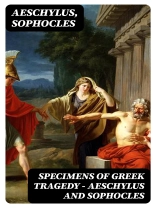Specimens of Greek Tragedy — Aeschylus and Sophocles is a curated exploration of two iconic dramatists whose works have defined the tragedy genre in ancient literature. This anthology presents a compelling selection of tragedies that span themes of fate, divine intervention, and human suffering. Without attributing individual pieces, the collection highlights the deep philosophical inquiries and dramatic prowess that characterize the tragedies of Aeschylus and Sophocles. The diversity within these tales—from royal downfall to the exploration of moral dilemmas—exemplifies the powerful narrative structures that continue to influence theatrical storytelling today. The contributing authors, Aeschylus and Sophocles, were pivotal figures in classical Athens, whose works are cornerstone texts in the study of Greek drama and its enduring legacy. Encompassing the cultural, social, and historical underpinnings of 5th-century BCE Athens, this anthology aligns with the Greek philosophical and dramatic traditions punctuated by questions of justice and piety. Each playwright contributes a unique voice—Aeschylus with his pioneering use of dialogue and Sophocles with his profound character development—enriching the anthology’s overarching theme. Offering a unique amalgamation of literary skill and thematic depth, Specimens of Greek Tragedy is an essential read for those interested in classical studies. This collection invites readers to explore varying perspectives on universal themes, fostering a deeper appreciation for the dramatic arts and an understanding of ancient Greek thought. As a scholarly endeavor, it encourages a dialogue between past and present, emphasizing the educational and philosophical value found within these ancient texts. Delve into this anthology for its breadth of insights and the timeless human experiences etched in its pages.
Mengenai Pengarang
Aeschylus (c. 525/524 – c. 456/455 BCE), ancient Greece’s foremost tragedian, has been revered as the ‘Father of Tragedy.’ His emblematic works significantly reshaped the narrative arc and scale of Greek theatre. Aeschylus’s contribution pivoted around expanding the number of actors from one to two, thereby inaugurating true dramatic dialogue. His corpus, once comprising some 70-90 plays, has been sadly reduced to seven complete tragedies, which nonetheless epitomize his mastery. Among these, ‘Agamemnon’ and ‘Prometheus Bound’ stand as illustrious exemplars of his prolific craftsmanship and profound exploration of human nature and divine interplay. His plays are lauded for their grandeur of language and innovation in plot, staging, and costume, which expertly infused his profound exploration of themes such as justice, power, and the human condition. Aeschylus’s theatrical brilliance is also preserved in the anthology ‘Specimens of Greek Tragedy — Aeschylus and Sophocles, ‘ which bolsters Interdisciplinary studies on his stylized narrative form juxtaposed with his contemporary Sophocles, another master tragedian. His artistry echoes through time, influencing countless generations of playwrights and leaving an indelible imprint on the heritage of Western literature and drama.












